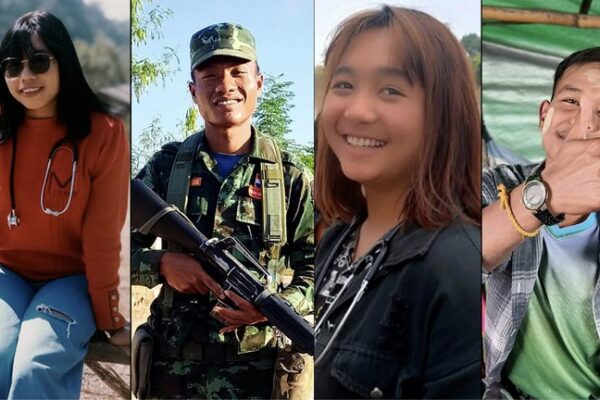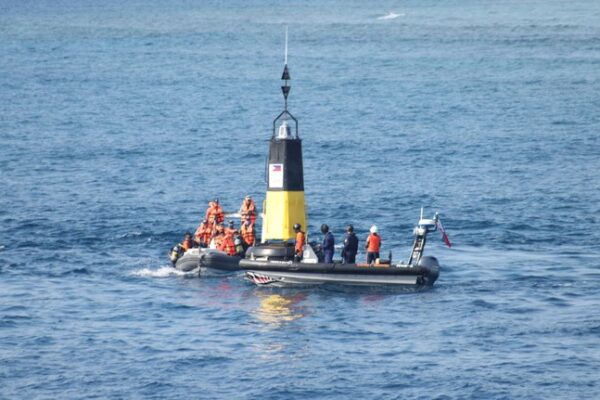
Beijing seeks ‘dialogue over confrontation’, defense chief says
China’s defense minister said at a major regional security forum on Sunday that Beijing seeks dialogue over confrontation, hours after a Chinese warship was accused of nearly hitting a U.S. destroyer in the Taiwan Strait. General Li Shangfu said at the Shangri-La Dialogue in Singapore that China’s leader Xi Jinping proposed a set of so-called Global Security Initiatives (GSI) which features “dialogue over confrontation, partnership over alliance and win-win over zero sum.” In an apparent reference to the U.S., Li accused “some country” of taking a “selective approach to rules and international laws,” and “forcing its own rules on others.” “It practices exceptionalism and double standards and only serves the interests and follows the rules of a small number of countries.” The minister said it “even attempts to constrain others with a convention itself has not acceded to,” pointing to the United Nations Convention on the Law of the Sea (UNCLOS) in 1982 that the United States, while recognizing it, is not a party of. The U.S. and China have been at loggerheads over a number of issues, among them China’s excessive claims in the South China Sea and the U.S. ‘s freedom of navigation operations (FONOP) to uphold its principle of a free and open Indo-Pacific. China has repeatedly accused the U.S. of “navigation hegemony” in the South China Sea. The U.S. military meanwhile said that a Chinese warship on Saturday came close to hitting an American destroyer when the latter was sailing through the Taiwan Strait during a joint Canada-U.S. mission. Near-collision The U.S. Indo-Pacific Command said in a statement that its guided-missile destroyer USS Chung-Hoon and Royal Canadian Navy frigate HMCS Montreal were conducting a “routine” transit through international waters in the Taiwan Strait. During the transit a Chinese Navy destroyer “executed maneuvers in an unsafe manner in the vicinity of Chung-Hoon,” it said, adding that the Chinese ship “overtook Chung-Hoon on their port side and crossed their bow at 150 yards (140 meters).” “Chung-Hoon maintained course and slowed to 10 knots to avoid a collision.” The Indo-Pacific Command said that China’s actions violated the maritime ‘Rules of the Road’ of safe passage in international waters “where aircraft and ships of all nations may fly, sail and operate anywhere international law allows.” China’s Ministry of National Defense claimed the Chinese ship handled the situation “lawfully and professionally” but analysts said they found the event “disturbing” and “probably the worst such reported close maritime encounter in the South China Sea since October 2018,” when a Chinese warship approached the USS Decatur within just 45 yards (41 meters). “China is getting reckless while trying to enforce sovereignty in the Taiwan Strait,” said Richard Bitzinger, a senior fellow at the S. Rajaratnam School of International Studies in Singapore. “Beijing is just trying to force everyone to accept the idea that Taiwan Straits are somehow China’s de facto territorial waters,” the military analyst told RFA. The Canadian Navy’s HMCS Montreal conducted a routine transit through the Taiwan Strait with U.S. Navy destroyer USS Chung-Hoon, June 3, 2023. Credit: Canadian Armed Forces Minister Li Shangfu told the audience at the Shangri-La Dialogue that the U.S. ships are in the region “for provocation.” “What is key now is that we must prevent attempts to use freedom of navigation … as a pretext to exercise hegemony of navigation,” he said. Taiwanese military analysts said that the Saturday transit was a routine operation but the Chinese Navy’s reaction indicated a more resolute stance. “As President Xi Jinping had instructed, senior officials and military leaders should take a tough stance against challenges rather than showing a soft behavior that can be seen as weak,” said Shen Ming-shih, Acting Deputy Chief Executive Officer of Taiwan’s Institute for National Defense and Security Research. “That’s what the Chinese Defense Minister demonstrated in his speech at the Shangri-La Dialogue,” Shen said. Military expert Richard Bitzinger said the reason behind this approach may be that “the Chinese are worried that they have a narrow and closing window to exert themselves before the economy tanks and demographics catch up with them.” Using risks as weapons The Chinese minister of defense in his speech lambasted the U.S.’s Cold War mentality. He accused Washington of “expanding military bases, re-enforcing military presence and intensifying arms race in the region” – those actions that reflect its “desire to make enem[ies], stoke confrontation, fuel the fire and fish in troubled waters.” Li also accused the U.S. of “wilfully interfering in the internal affairs of others,” referring to the issue of Taiwan which he said was “core of China’s core interests.” The U.S. and China should seek common ground “grow bilateral ties and deepen cooperation,” he said. “International affairs should not be handled through confrontation,” the minister said, insisting that China is always “seeking consensus, promoting reconciliation and negotiations.” Chinese Defense Minister Gen. Li Shangfu delivers his speech on the last day of the Shangri-La Dialogue, in Singapore, June 4, 2023. Credit: AP Photo/Vincent Thian A day earlier, U.S. Secretary of Defense Lloyd Austin said he was “deeply concerned” that Beijing has been unwilling to engage with Washington and refused to hold direct bilateral talks. “The Chinese minister’s speech at the Shangri-La Dialogue and the dangerous action of its warships in the Taiwan Strait are part of the strategy that I’d call ‘riskfare’, which plays on the concerns of the U.S. and other countries for risks,” said Alexandre Vuving, a professor at the Daniel K. Inouye Asia-Pacific Center for Security Studies in Hawaii. “The U.S. emphasizes communication, but China emphasizes risks and is using risk as a weapon in its struggle with the U.S.,” he said. “Washington shows it’s concerned about risks in its competition with Beijing. Beijing sees it and weaponizes this U.S. concern.” The U.S.’s willingness to reopen communications with China is genuine and some analysts believe that, despite the absence of direct contacts between the U.S. and Chinese delegations in Singapore, there are hopes for closer interactions. Baohui Zhang, director of the Centre for Asian…







